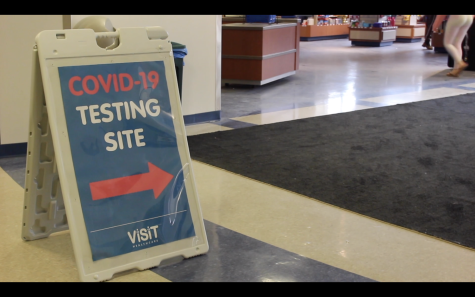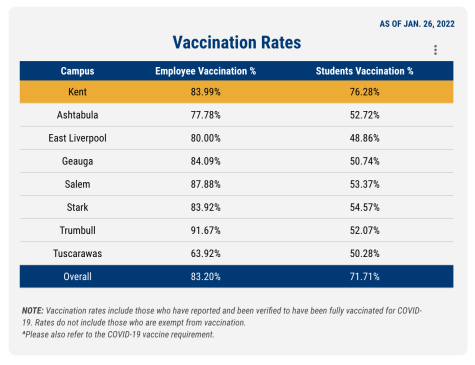Increasing levels of psychological distress develop among college students during pandemic
A chart from the Active Minds study. The asterisk (*) indicates a statistically significant difference in answers from college vs. high school students. In this study, college students are those seeking a bachelor’s degree, and high school students are those seeking a high school diploma.
October 30, 2020
A survey conducted in March concluded one in every four Kent State students reported feeling psychological distress, said Joel Hughes, a professor in the psychology department and director of clinical training.
Months later, as the COVID-19 pandemic continues, college students continue to face increasing levels of mental health problems.
Hughes studies the mental health effects the pandemic has on college students. He is working on a new survey to see how COVID-19 has directly impacted students in the past six months, he said.
“Humans have a need to congregate, and loneliness is a huge problem right now,” he said.
Indeed, 78% of college students said they feel loneliness, according to a September student mental health survey by Active Minds.
“I miss seeing my friends in-person,” said Sean Gauntner, a sophomore global communications major. “Some live far away from me, and it’s not easy to see them anymore.”
Gauntner decided to live at home this semester to save money, and while he is glad he made this decision, he said wishes he could be on campus again.
Not being around people is also a problem for Mackenzie Matlack, a senior marketing major.
“A lot of my social interactions are over a screen, and it doesn’t fully charge my extrovert battery,” she said.
As graduation approaches, Matlack said, she feels stressed for her future.
“It’s challenging to have to think about my future when everything is so uncertain,” she said. “I don’t want to attend career fairs or even think about what to do after graduation. I feel a bit overwhelmed about the future as a whole.”
In fact, 89% of college students said they feel stress or anxiety in the Active Minds study and 79% said they feel disappointment or sadness.
On top of these stressors, students are navigating the virtual learning environment. In March, about as many as two-thirds of college students said they felt concerned about focusing during online classes in a survey by Barnes & Noble Education.
“Classrooms are designed to be distraction-free,” Hughes said. “You cannot always be distraction-free in this new environment, making concentrating more challenging.”
Focusing in classes has been especially difficult for Sarah Hershberger, a freshman early childhood education major, because she currently has a concussion, she said.
“It is a lot harder to stare at a screen all day and not get distracted,” she said. “I will definitely have to work harder this semester than I did in previous semesters.”
Hershberger has also run into problems with online communication, she said.
“It is challenging trying to communicate with professors,” she said. “I have professors who don’t check their emails often.”
Gauntner has felt that in-person classes would work better for him, he said.
“I sit here at my computer all day every day, frantically trying to complete my work on time,” he said. “It’s so easy to get distracted doing work at home, too. If I’m bored I can just pull out my phone, watch TV or lay in bed.”
Taking classes from home has led to students getting less exercise, according to the Active Minds study. 56% of respondents said their daily level of physical activity has decreased.
“I am guilty of not getting enough physical activity this semester,” Gauntner said. “I have to sit at the computer all day working on homework.”
For Matlack, walking to and from classes every day was a form of exercise.
“With in-person classes, trekking all around campus each day was a workout in and of itself,” she said.
Along with the increase of mental health issues, Hughes worries about the physical health issues the pandemic may bring, he said.
“One of my concerns includes mental health problems turning into physical problems,” he said. “Weight gain, heart disease and high blood pressure can result from mental illness.”
Even with these new hardships placed on students, Hughes said he is confident in their resilience.
“As humans, we’ve been through things like world wars and natural disasters. This level of distress you may be feeling will most likely not stay elevated forever,” he said. “Now is the time to take care of yourself by sleeping enough, eating right, exercising and socializing in a safe manner.”
The American Psychological Association’s strategies for increasing your capacity for resilience include prioritizing relationships, taking care of your body, practicing mindfulness, avoiding usage of alcohol and drugs to numb pain, helping others, accepting change and seeking help. 67% percent of respondents in the Active Minds study said they have been increasing their support of others’ mental wellness, and two-thirds said they received information from their institution regarding mental health.
Gauntner, Hershberger and Matlack all said they have received information through email about on campus mental health resources, including counseling.
“Even if this is all a bit stressful right now, I know I will be able to succeed,” Matlack said. “I just keep trying to remind myself that this situation is teaching me lessons and making me a stronger and more well-rounded person.”
Megan Medfisch is a health and fitness reporter. Contact her at [email protected].
SUPPORT STUDENT MEDIA
Hi, I’m Lauren Sasala, a senior journalism student from Toledo. I’m also the editor in chief of The Kent Stater and KentWired this semester. My staff and I are committed to bringing you the most important news about Kent State and the Kent community. We are full-time students and hard-working journalists. While we get support from the student media fee and earned revenue such as advertising, both of those continue to decline. Your generous gift of any amount will help enhance our student experience as we grow into working professionals. Please go here to donate.



















